DO-IT Retrospective: 25 Years of Success!
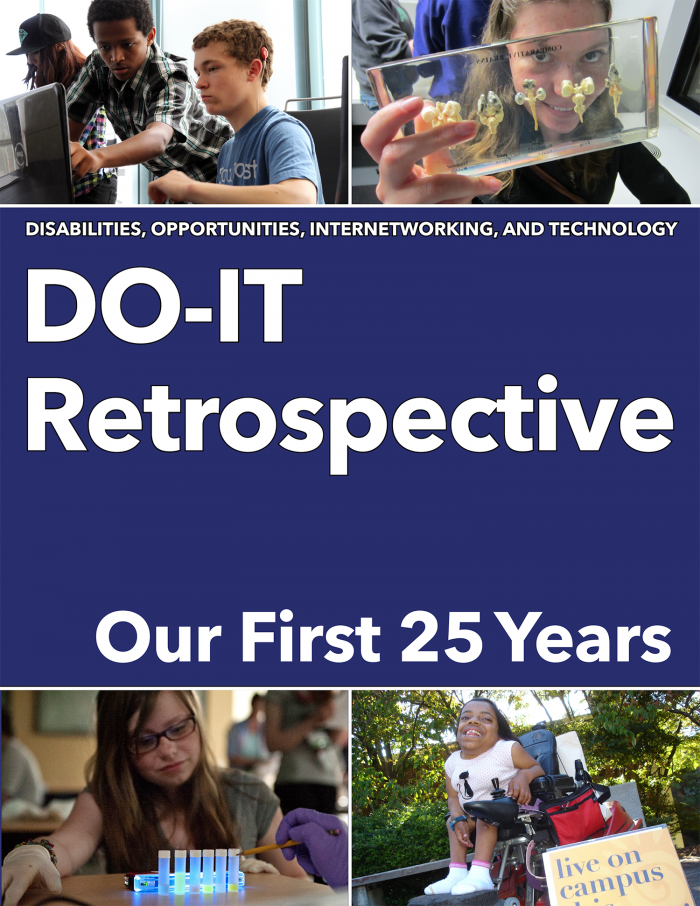
From the Director
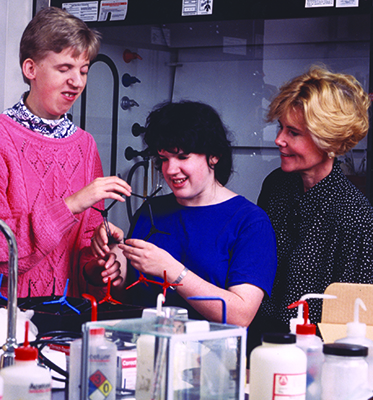
Have we really been “doing–it” for 25 years? Well, time flies when you’re having fun, and that makes sense when it comes to DO-IT (Disabilities, Opportunities, Internetworking, and Technology). In this publication we share DO-IT’s past, present, and plans for the next 25 years.
In our flagship program, DO-IT Scholars, nearly 500 high school students with disabilities have learned to use technology to maximize their independence and productivity, networked with successful people who have disabilities, and engaged in activities that help them prepare for challenging college studies and careers. Pictures on the facing page include a Scholar from our very first year and a current Scholar, respectively. It is exhilarating to witness them reach personal milestones, continue to participate in DO-IT as mentors to incoming students, speak in classes and at conferences, and become leaders in their fields. The successful practices of the DO-IT Scholars program have been replicated to benefit thousands of youth with disabilities through other projects and collaborative efforts, including those in Japan, Malaysia, and Singapore.
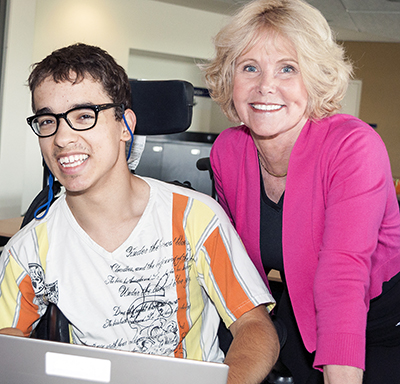
DO-IT works with everyone who can contribute to the success of people with disabilities in challenging academic programs and careers: disability service providers, employers, educators, parents, governmental agencies, and high tech companies. Organizations and activities are summarized in the Student-Centered Community Building Model. For example, we have partnered with University of Washington computer science professor Richard Ladner since the inception. Richard and I have now co-directed our AccessComputing project for over ten years. Funded with over 10 million dollars from the National Science Foundation, we have partnered with dozens of other institutions and professional organizations nationwide to promote the success of people with disabilities in computing fields of study, research and careers and the inclusion of accessibility topics in the computer science curriculum. Through over 30 programs, presentations, capacity building institutes, online classes, and conferences, DO-IT and its partners help people work more effectively with individuals with disabilities. We share successful practices around the world through electronic resources, printed materials, videos, and discussion forums.
This is an exciting time as we witness more people with disabilities realizing their potential and more organizations recognizing the benefits of a diverse workforce that fully includes people with disabilities. Yet, there are so many challenges ahead. We will continue our successful partnerships and create new ones to address critical needs in our society. I invite you to share your talents and resources to extend our reach.
Sheryl Burgstahler, Ph.D.
Director, DO-IT Center and Accessible Technology Services
Affiliate Professor, College of Education
University of Washington
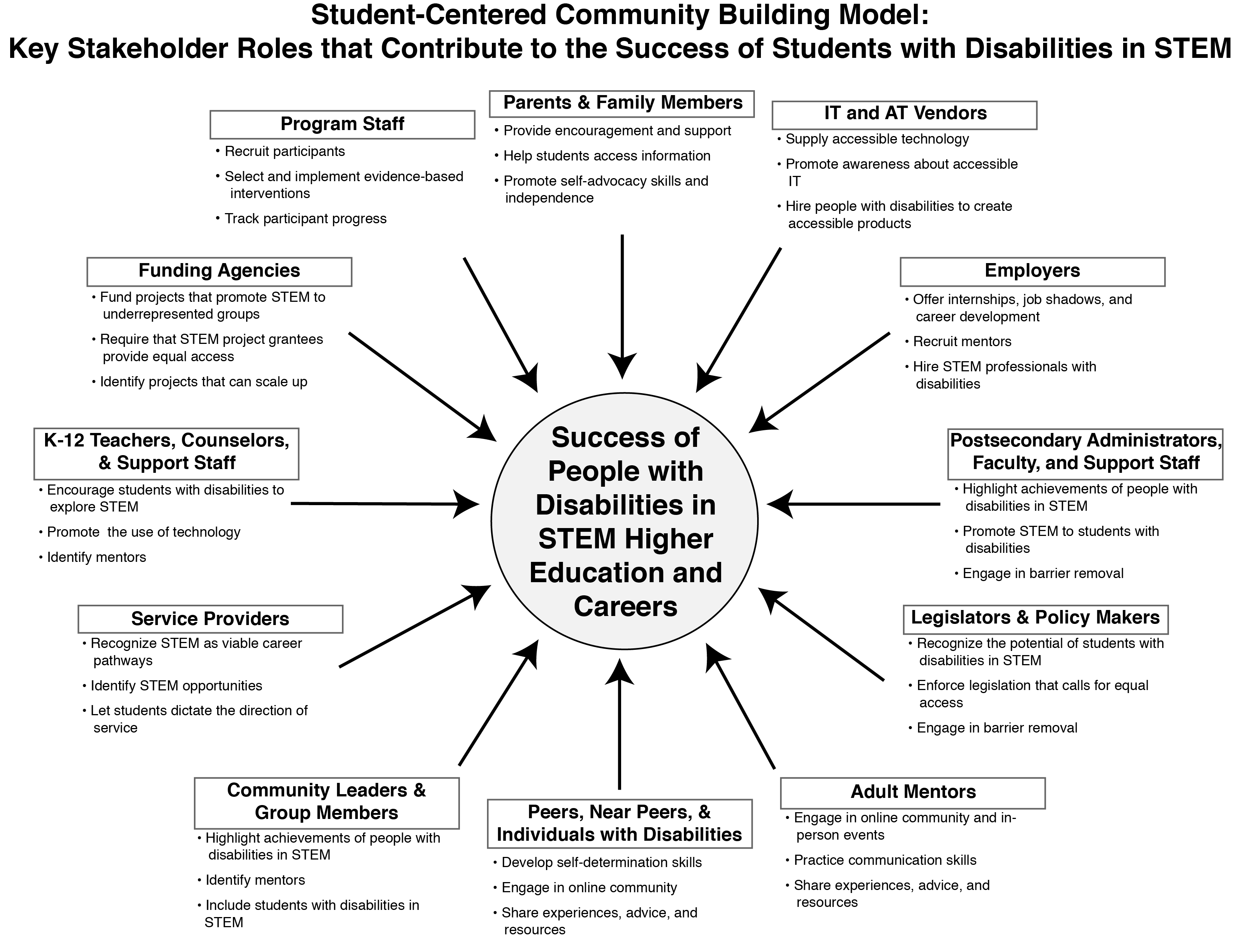
DO-IT History
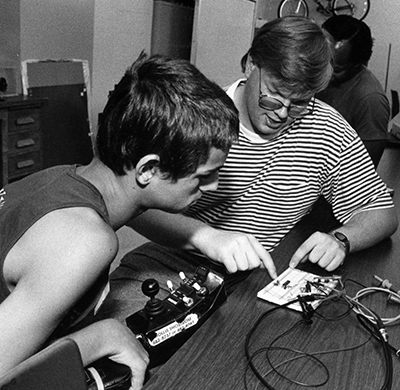
In October 1992, Sheryl Burgstahler envisioned a world where all people with disabilities could reach their full potential and contribute their unique perspectives and talents to society. She requested a grant from the National Science Foundation (NSF) with the goal of increasing the representation of individuals with disabilities in science, technology, engineering and mathematics (STEM) academic programs and careers.
NSF funded numerous activities that include summer programs and online communities for students with disabilities and disability training for educators, employers, service providers, and other stakeholders. The U.S. Department of Education also funded training for postsecondary faculty, service directors, and technology specialists to employ universal design strategies to make their offerings more inclusive. The Department of Labor, Microsoft, Boeing, Washington State, and private donations also provided funding.
The collection of all of these projects is what we call “DO-IT.” We and our partners currently manage more than ten programs—each with unique objectives, budgets, activities, and timelines that have taken us on a wild ride that has been rewarded with the success of thousands of people with disabilities.
DO-IT Programs
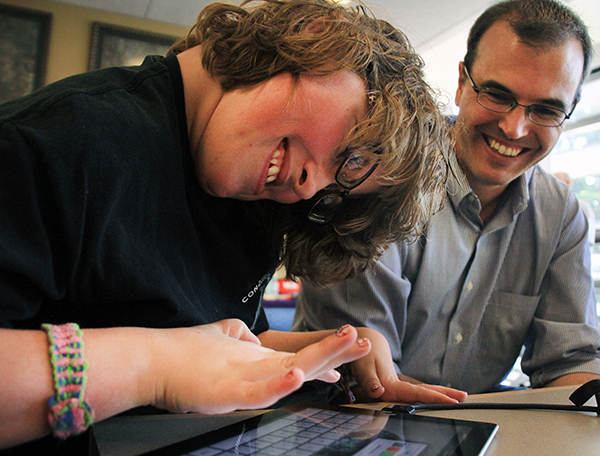
DO-IT has undertaken dozens of specific programs. Current endeavors, including those summarized below, are described at www.uw.edu/doit/programs.
DO-IT Scholars
The DO-IT Scholars program has engaged more than 500 high school students with disabilities in pursuing college and careers and developing leadership skills. These “doitkids” are encouraged and supported by project staff and successful students and professionals with disabilities as they engage in internships and other work-based learning activities, residential summer programs, conferences, and online forums.
AccessComputing
Partnering with stakeholders nationwide, AccessComputing helps students with disabilities successfully pursue degrees and careers in computing fields and increases the capacity of institutions and companies to fully include people with disabilities in computing courses and careers, thus improving these fields with the expertise and perspective of this underrepresented group.
AccessSTEM
AccessSTEM helps students with disabilities succeed in science, technology, engineering, and mathematics (STEM) and succeed in college studies and careers in STEM as presented in the Critical Junctures model.
AccessEngineering
Partnering with engineering faculty, professional organizations and students nationwide, AccessEngineering increases the participation of people with disabilities in engineering academic programs and careers and the inclusion of disability-related topics in engineering curriculum.
AccessERC
AccessERC works with Engineering Research Centers (ERCs) nationwide to increase the engagement of people with disabilities and the inclusion of more accessible activities and resources.
AccessCyberlearning
AccessCyberlearning fosters synergistic and lasting relationships among researchers, technology developers, and instructors to promote more inclusive online learning.
25 Years at a Glance

| 2000+ students actively involved in projects and engaging with mentors |
95% DO-IT Scholars have attended college |
30+ programs and initiatives that empower people with disabilities |
|
800+ research and industry internships completed by participants |
50 states with participants, mentors, and/or collaborators |
55 summer camps hosted at University of Washington (34), Camp Courage (15), and other campuses (11) |
|
33 national capacity building institutes for over 600 stakeholders |
100+ minigrants awarded to other institutions |
60+ electronic communities promoting equal access |
|
70+ training and advocacy videos produced |
800+ articles in the online Knowledge Base |
$50m+ grant funding received to support DO-IT’s mission |
Critical Junctures for STEM Students with Disabilities
DO-IT interventions sponsored by NSF are organized into a model of inputs to promote movement through critical junctures to bring students with disabilities into STEM fields.
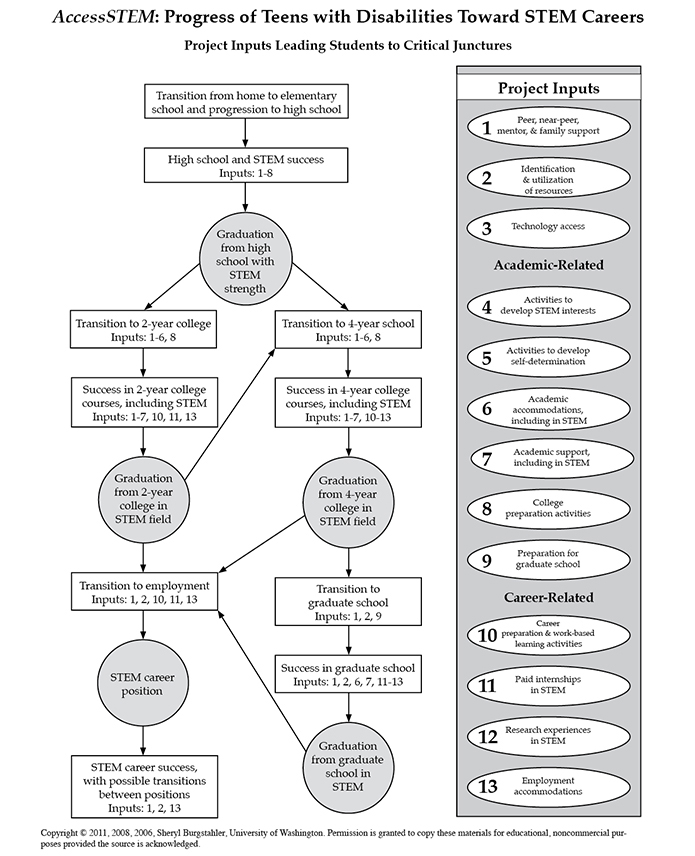
Awards

The DO-IT Center, its staff, and its participants have been featured in numerous articles in newspapers, journals, and magazines. Staff, mentors, and collaborators have received many local, regional, and national awards. A few are described below.
2017 Induction into the Susan M. Daniels Disability Mentoring Hall of Fame
DO-IT was inducted for its comprehensive mentoring program and its position as the longest standing online mentoring community for individuals with disabilities in the world.
2012 Strache Leadership Award
Sheryl Burgstahler was honored for her leadership in working with students as an educator and mentor and empowering people with disabilities with technology.
2007 Career Opportunities for Students with Disabilities Greenberg Award for Innovation
Presented to Sheryl Burgstahler, it recognized innovative efforts in securing employment opportunities for students with disabilities.
2007 American Society of Engineering Education Best Zone Paper Award
Richard Ladner and Sheryl Burgstahler, co-directors of AccessComputing, and Tammy VanDeGrift and Annamarie Poginy were recognized for their manuscript, The Game of Life Workshop - Reaching Out to High School Students with Disabilities.
2006 Trace Research and Development Center Catalyst Award
The Trace Research and Development Center recognized Sheryl Burgstahler for extraordinary accomplishments in motivating stakeholders to promote the success of people with disabilities.
2002 Washington Association for Postsecondary Education and Disabilities (WAPED) Achievement Award
WAPED recognized the exemplary work of DO‑IT in helping students with disabilities achieve success in postsecondary education.
2000 Golden Apple Award
DO-IT’s contributions to excellence in precollege education in Washington State were recognized.
1999 Best of the Northwest Film Video Festival Award of Excellence - Informational Category
The producer of DO-IT videos, Charlie Hinckley, was recognized for The Winning Equation - Access + Attitude = Success.
1997 The President’s Award of Excellence in Mentoring
President Clinton recognized DO-IT’s success in mentoring students with disabilities in STEM.
1995 The National Information Infrastructure Award in Education
Recognition was given to DO-IT for the its creative use of the Internet with individuals with disabilities.
1995 Washington Association for Postsecondary Education and Disabilities (WAPED) Organization Award
Presented to DO-IT for an outstanding record of service to people with disabilities.
More information about awards presented to DO-IT, its staff, and participants can be found at www.uw.edu/doit/about/awards.
DO-IT Success Stories
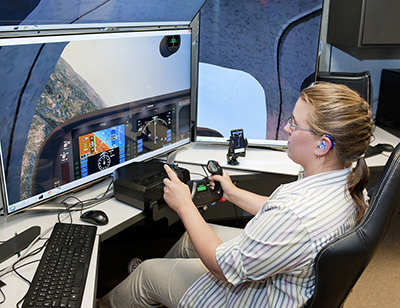
Johanna, AccessComputing
My high school didn’t have computer science classes; I had no exposure to computer science until I was 16 years old. That year, I was accepted into AccessComputing’s Summer Academy for Advancing Deaf and Hard of Hearing in Computing, a nine-week program at University of Washington. When I learned about HTML and JavaScript, it was like a brand new world to me. I loved the puzzle of figuring it out and realized that computer science was a good match for me. I was invited back as a teaching assistant for the Summer Academy the following summer, where I learned about Java. It was amazing experience overall. I continued studying computer science at the University of Minnesota.

Angela, DO-IT Scholar
I attend Gonzaga University. I’m studying psychology to prepare myself for medical school. Between taking classes, having fun with my friends, and volunteering, I hold a student assistant job in one of the offices on campus and am an officer for the Gonzaga Environmental Organization. I have also completed a STEM internship through the Center for Neurotechnology at the University of Washington. I was born with muscular dystrophy, but this has only made me more aware of my abilities, which in turn makes me determined to utilize my college education to improve the lives of others. I currently plan on entering the medical field and specializing in pediatrics or psychiatry so I can help people with conditions similar to mine.
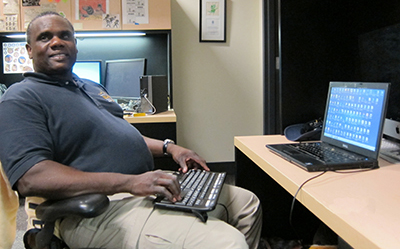
Vincent, DO-IT Mentor
My mother told me that the encyclopedias that still sit on the shelves in their house in my hometown were purchased because of my constant questions about how everything worked. Even playing sports, I always took the analytical route towards getting something accomplished. I’m sure that’s what started my journey into a STEM-related major and career. I often couldn’t find answers to my questions: instead, more intriguing and complex questions always unfolded. These days, I use my technical background to create modifications that would make me an efficient and productive worker.
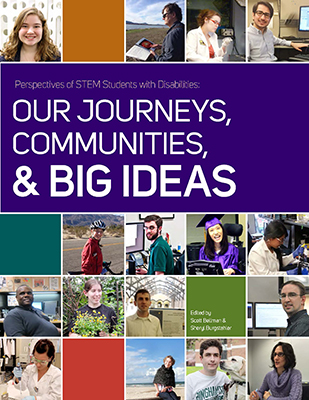
Our Participants
Hundreds of DO-IT participants have achieved amazing goals. Participants are earning degrees in a wide variety of interesting and competitive fields, then gaining employment in challenging and world-changing careers.
To learn more about the journeys of DO‑IT participants, consult the resources below.
Perspectives of STEM Students with Disabilities: Our Journeys, Communities, and Big Ideas
A Bold Vision and Looking Forward
A Bold Vision
The DO-IT Center empowers people with disabilities through technology, education, self-determination and leadership training, and mentor support. It promotes awareness and accessibility—in both the classroom and the workplace—to maximize the potential of individuals with disabilities and make our communities more vibrant, diverse, and inclusive.
The DO-IT Center strives to
- increase the success of people with disabilities in challenging academic programs and careers, including those in STEM;
- promote the universal design of physical spaces, information technology, instruction, and services and of disability topics to be included in curriculum; and
- create and freely distribute online content, publications, and videos for students with disabilities, K-12 educators, postsecondary faculty and administrators, librarians, employers, parents, and mentors.
Looking Forward
People with disabilities continue to face unique barriers to education and employment. These barriers include lack of encouragement; underdeveloped self-advocacy skills; little access to successful role models; social isolation; lack of awareness of technology that can increase success; and low expectations from those around them. As DO-IT looks to the future, we seek funding to further address these barriers.
We will continue to cast a wide net, serving students, job-seekers, educators, administrators, service providers, employers, policy-makers, and other stakeholders. Guidance as we create new initiatives and projects will come from
- broadening participation, academic and career development, and self determination literature;
- people with disabilities;
- DO-IT parents and mentors;
- employers; and
- the adoption of successful practices from previous DO-IT projects.
25 Ways DO-IT Is Changing The World... And How You Can Help
25 Ways DO-IT Is Changing The World
- Listening to the concerns of people with disabilities.
- Promoting the view that disability is one aspect of the diverse human experience.
- Expecting people with disabilities to excel.
- Teaching parents to set high expectations for students with disabilities.
- Providing resources to precollege and postsecondary educators.
- Connecting individuals with disabilities to mentors and facilitating their engagement.
- Hosting college-preparation camps for youth with disabilities.
- Promoting inclusive learning environments.
- Identifying future leaders with disabilities.
- Highlighting success stories of people with disabilities.
- Hiring people with disabilities as staff and interns.
- Partnering with employers to encourage the hiring of individuals with disabilities.
- Sharing the history of the disability civil rights movement.
- Educating people about legal mandates for access.
- Promoting access to empowering technology.
- Demonstrating accessible science equipment.
- Advancing universal design of instruction, physical spaces, technology, and services.
- Promoting accessibility topics within computing and engineering curriculum.
- Creating and sharing videos about equal access.
- Captioning videos and encouraging others to do the same.
- Advocating for accessibility of websites, documents, and software.
- Promoting accessible online learning.
- Promoting accessible conferences, meetings, and events.
- Connecting stakeholders through regional and national workshops.
- Publishing best practices for others to replicate.
And How You Can Help
- Mentor a person with a disability.
- Learn more about assistive technologies (e.g., screen readers, alternative keyboards and mice) and help people with disabilities get access to them.
- Share success stories of people with disabilities.
- Talk about disability as a normal part of the human experience and celebrate disability as one aspect of diversity.
- Everywhere you go, think about accessibility for individuals with a wide range of abilities, and make suggestions to those in charge.
- Volunteer at programs for youth with disabilities.
- Expect people with disabilities to show up in every environment and prepare for them.
- Attend professional development opportunities about supporting individuals with disabilities.
- Understand the history of civil rights for people with disabilities.
- Learn how universal design can impact access to education, physical spaces, services, and technology.
- Caption your videos and encourage others to do the same.
- Promote the accessible design of online learning, websites, and documents.
- Tell parents and teachers to set high expectations for students with disabilities.
Here are some resources to get you started:
DO-IT Partners

DO-IT thrives through partnerships. Partners engage with us to discover new ideas, spread our mission, recruit participants, and implement interventions that make institutions and industry around the world more welcoming and accessible to individuals with disabilities.
Partners participate in our programs with the following activities:
- engage in conferences and capacity building institutes and other conferences
- participate in project training and communities of practice
- committing to making their courses, resources, programs, and/or workplaces and hiring practices more welcoming and accessible to people with disabilities
- exploring opportunities for students with disabilities to intern in their fields
- gathering and share data used to measure changes in the engagement of people with disabilities in their programs
- reviewing resumes and hire capable students with disabilities
To learn more about becoming a partner in a DO-IT project, send an email to doit@uw.edu.
Research and Best Practices
DO-IT publishes best practices and research findings in peer-reviewed and other journals. These publications allow thousands of stakeholders to learn about DO-IT’s evidence-based practice and access tools and training materials. Journals where the work of DO-IT and its partners has appeared include the following:
- Journal of Postsecondary Education and Disability
- WORK: A Journal of Prevention, Assessment, and Rehabilitation
- Information Technology and Disabilities Journal
- ACM Transactions on Computing Education
- NeuroRehabilitation
- Creative Education
- Journal of Science Education for Students with Disabilities
- Disability & Rehabilitation: Assistive Technology
- Journal of Vocational Rehabilitation
- The Review of Disability Studies
- Journal of School Public Relations
- Research in Learning Technology
- American Society for Engineering Education
- Assistive Technology Outcomes and Benefits
- Journal on Excellence in College Teaching
- Journal of Graduate Teaching Assistant Development
- Journal of Research on Technology in Education
- The Journal of Rehabilitation Administration
- National Association of Colleges and Employers Journal
30 Years of Results

A rich body of evaluation and research data has been collected on DO-IT programs. It includes reports from participants, parents, mentors, and other stakeholders who glean the value of program interventions. Some of the results are summarized below:
- Parents of DO-IT Scholars report that DO-IT increased their children’s interest in college; awareness of career options; self-esteem; and self-advocacy, social, academic, and employment skills.
- DO-IT Scholars report that DO-IT participation helped them prepare for college and employment; develop Internet, self-advocacy, computer, social, and independent living skills; increase awareness of career options; and increase self-esteem and perseverance.
- DO-IT Scholars say that the greatest effects of the Summer Study experience are the development of social skills, followed by academic and career skills.
- DO-IT Scholars consider themselves significantly improved in academic skills, social skills, levels of preparation for college and employment, levels of awareness of career options, and personal characteristics such as perseverance and self-esteem during the course of their participation in the DO-IT Scholars program.
- DO-IT Scholars report the value of online communication for peer, near peer, and mentor support, which included being able to stay close to friends and family; to get answers to specific questions; to meet people from around the world; and to communicate with many people at one time independently and without disclosing their disabilities.
- Those who participated in work-based learning opportunities report increased motivation to work toward a career; knowledge about careers and the workplace; job-related skills; ability to work with supervisors and coworkers; and skills in self-advocating for accommodations.
- DO-IT mentors report engagement with participants around STEM, college, disability, careers, computers, assistive technology, and the Internet.
Participants in the AccessSTEM/AccessComputing/DO-IT Longitudinal Transition Study (ALTS) highly rate the value of DO-IT activities they consider most beneficial and which are most important for achieving positive postsecondary outcomes. Check out the current results of this ongoing study at www.uw.edu/doit/2016-report-accessstemaccesscomputingdo-it-longitudinal-....
Make a Gift
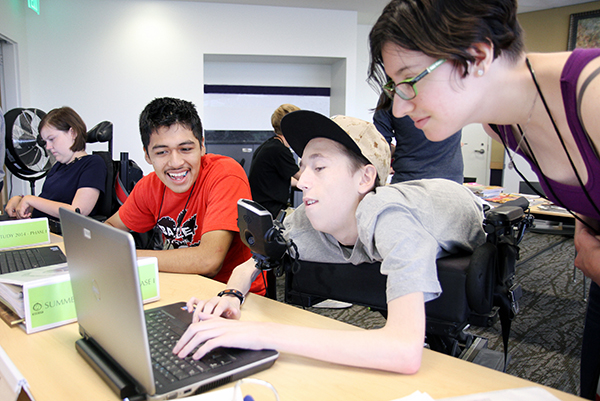
DO-IT Funders
DO-IT funding comes from the state of Washington, the National Science Foundation, the U.S. Department of Education, corporations, foundations, and people like you. Learn more about our funders at www.uw.edu/doit/about/funding-and-support/do-it-funding-and-partners.
Make a Gift
Every person deserves the chance to undertake challenging academic programs and careers. People with disabilities offer unique perspectives and abilities to any discipline. DO-IT would not be possible without generous contributions. Your support is needed to sponsor participants in the Scholars program, special events, internships, and other academic and work- based learning experiences for individuals with disabilities and stakeholders. To make a gift to DO-IT, visit www.uw.edu/giving/make-a-gift/?page=make&code=DOITFD.
A Special Thanks
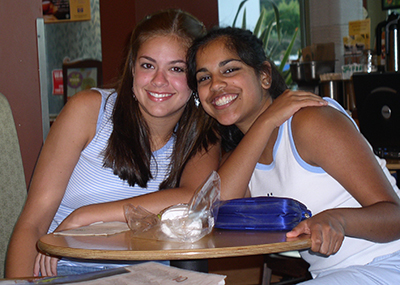
A special thanks to the state of Washington, the National Science Foundation, the U.S. Department of Education, and the foundations, corporations, and funders who have supported DO-IT’s mission over the past 25 years.
And thank you to all of DO-IT’s staff, volunteers, parents, partners, and allies for helping participants set high goals, create concrete plans, develop academic and life skills, and persist in their unique journeys in challenging academic programs and competitive careers.
With your support, one can only imagine what DO-IT will achieve in the next 25 years.
© 2017 University of Washington